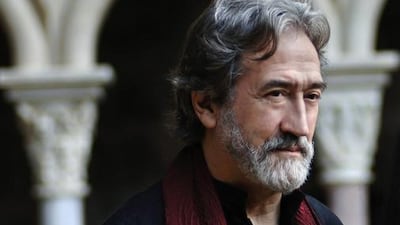The scholarly boundaries between history, geography and music are blurred beyond recognition in the work of Jordi Savall, the leading early-music specialist, who this week makes a welcome return to the UAE.
It was a coup when, a little more than two years ago, the viola and rebab player debuted his epic Ibn Battuta: The Voyager of Islam I: From Morocco to Afghanistan (1314-1336) in Abu Dhabi. An ambitious conceptual suite, it was broadcast around the globe.
Now the celebrated Spaniard returns to present the sequel, and closing chapter, Ibn Battuta: From Afghanistan to China (1336-1346), in Abu Dhabi and Al Ain, on Saturday and Sunday. The new programme picks up where we left Battuta, in Constantinople, and follows his journey through Afghanistan, India, Indonesia, China and beyond.
Savall’s group, Hespèrion XXI, will be expanded to a cast of 20 musicians from 12 countries, employing a colourful combination of traditional instruments to imagine sounds the great Moroccan writer and explorer would have heard along the way. We spoke to Savall to find out more.
What inspired you to devote so many years to researching, imagining, composing and recreating onstage the travels of Ibn Battuta?
Most people don’t realise today this is the most important traveller from all the centuries, and from all travellers – he travelled much farther and documented much more than Marco Polo. He gathered so much interesting information about all the places that he went to – the traditions, the situations – he was involved in the politics, he married several times. His is a really incredible history.
Can we really imagine today what Battuta might have heard and felt?
In a certain way, music is the best time-travel machine. When you listen to a song from the 14th century, you have the same emotions that people had at that time. The way humans react to emotions has not changed over the centuries. We have different education and superstitions, but the essential things in humanity haven’t changed, and music is one of the ways we are reminded of what can touch us.
Is the Ibn Battuta project the most ambitious work of your career?
This [work] is special today, because we live in a moment which is really very disappointing – we are scared, we are confusing diversity, making things against the human solidarity. It’s important, making music, to show that we can be together. This testimony – of 20 people from so many different cultures playing music together in harmony, in peace, with respect – is a very important message today.
You will be again joined by Emirati musicians, including oud player Saeed Al Salem. What have you learnt from visiting the UAE?
I feel it’s important for me to perform in the UAE – it’s at the same time an old country and very new – you get something from a very ancient civilisation, and at the same time, you feel an energy – buildings, new bridges and communications. And of course, the contact with the desert is a difference we cannot imagine in Europe.
You are 75 years old. How has the wisdom of experience added to your career?
Age is a mental thing – as long as you are fascinated with doing new things, you have new projects to study, you have the capacity to think and move – then there’s no reason to stop. I have the privilege to do work which is also my hobby – making music makes me happy, and sharing the music with people all over the world gives my life a sense. In my age, I have adopted the advice from Gandhi who said: ‘You must live every day as if it will be the last day of your life and study every day as if you will live 1,000 years more’. I know I’m old – but also I’m not. As long as you have enthusiasm and people you love, all the elements will keep you alive.
You have spent decades studying music from every century, all over the globe. What time and place would you like to visit most?
This is a very difficult question. I'd like to be in so many places. For example, in Venice, when Claudio Monteverdi created the Vespro della Beata Vergine. In Berlin, when Felix Mendelssohn first performed the St Matthew Passion by Johann Sebastian Bach. Or in Vienna, for the first performance of the Eroica symphony [No 3] by Ludwig van Beethoven. There are many places I would like to go to.
• Jordi Savall performs at Emirates Palace on Saturday, January 14 (not Friday as previously booked) and at Bin Hamoodah Fort, Al Ain Oasis, on Sunday (January 15), at 8pm. Tickets from Dh80 (students Dh30). www.abudhabiclassics.ae
rgarratt@thenational.ae

